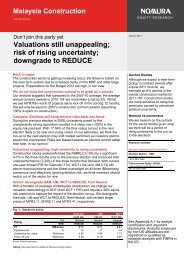Download PDF - ETP - Pemandu
Download PDF - ETP - Pemandu
Download PDF - ETP - Pemandu
You also want an ePaper? Increase the reach of your titles
YUMPU automatically turns print PDFs into web optimized ePapers that Google loves.
<strong>ETP</strong> ANNUAL REPORT 2011<br />
This list of initiatives will be constantly reviewed and enhanced<br />
periodically depending on the latest economic scenarios to<br />
achieve the best outcome and impact for the country.<br />
Achievements<br />
Immediate results were shown with the implementation of<br />
Widening E-bidding. With the lab initiative, the E-bidding’s original<br />
threshold value was reduced from RM200,000 to RM50,000 for<br />
the procurement of goods and services and implemented on 5<br />
April 2011. As of 31 December 2011, a total of RM25.34 million<br />
was saved compared with the target of RM20 million, 26.7 per<br />
cent above target.<br />
E-bidding is a more transparent procurement methodology where<br />
biddings are carried out online among qualified companies for:<br />
1. Generic goods with a standard set of specification without<br />
the need to go through a complex and complicated technical<br />
evaluation<br />
2. Goods and services which are managed under the panel<br />
system<br />
3. Generic types of services with a common set of scope and<br />
specification<br />
A capacity building programme for procurement officers is being<br />
developed as part of an on-going process at the Ministry of<br />
Finance. In addition, a new training program is being developed<br />
together with National Institute of Public Administration (INTAN)/<br />
Public Service Department (JPA), Department of Works (JKR)/<br />
Ministry of Works (KKR) and other core Ministries to further<br />
strengthen the capacity building of procurement officers.<br />
Through the new training program, all aspects of Government<br />
Procurement will be covered to ensure that procurement officers<br />
would be equipped with the necessary knowledge and skills. The<br />
new training programme will enable trained officers to implement<br />
“Value Management for Operating Expenditure Procurement” as<br />
part of the procurement planning initiative from 2012 onwards.<br />
The Ministry of Finance will monitor the execution of procurement<br />
plan by government agencies as stated in the Treasury’s circulars.<br />
In 2011, 53 awareness programmes were conducted to educate<br />
the public sector, business community and rakyat on the initiative<br />
to implement the Goods and Services Tax (GST) to replace the<br />
current sales tax and service tax. The programmes attracted an<br />
audience of 4,941 people, and feedback obtained has been taken<br />
under consideration by the relevant parties involved.<br />
Exhibit 13.6<br />
Target Group No. of<br />
Programmes<br />
220<br />
No. of Attendees<br />
Government 22 1,620<br />
Industry 28 2,997<br />
Consumer 3 324<br />
Total 53 4,941<br />
A broad-based consumption tax, GST will be levied on the ‘value<br />
added activities’ along the delivery chain. Most basic products and<br />
services such as rice, raw meat, fresh fish, vegetables, domestic<br />
public transportation and healthcare services will be exempted or<br />
zero-rated. The estimated additional revenue from implementing<br />
the GST in its first two years is between RM6-10 billion. This is<br />
dependant on the rate implemented, anticipated at four to five<br />
per cent.<br />
The Inland Revenue Board (IRB) has completed the groundwork<br />
necessary to implement its initiatives to improve tax administration<br />
and compliance for direct tax collection from 2012. Amongst the<br />
initiatives is to widen field audit & investigation coverage. The IRB<br />
has implemented measures which include:<br />
1. Redeployment of auditors from field audit to transfer pricing<br />
and specialised industries<br />
2. Re-engineering of desk audit process<br />
3. Enhancing usage of data warehouse in order to identify highrisk<br />
cases to be audited<br />
Similar to the IRB, the Royal Malaysian Customs Department<br />
(RMCD) has also started implementing initiatives to improve tax<br />
administration and compliance for indirect tax collection. One<br />
such initiative, the enhancement of audits and enforcement was<br />
implemented in the second half of 2011. This has resulted in an<br />
additional collection of RM67.39 million, 81.2 per cent of the target<br />
of RM83 million. The enhanced enforcement came in the form of:<br />
1. Informing businesses of new requirements in conducting<br />
audits:<br />
• Special audit (joint operation)<br />
• Periodic audit<br />
2. Increasing audit coverage on registered licensees and<br />
importers:<br />
• Reviewing audit targets<br />
• Enhancing competency of audit officers through capacity<br />
building<br />
3. Improving audit mechanisms:<br />
• Increasing the number of licenses of computer Assisted<br />
Audit Techniques (CAAT) software<br />
Revising standard auditing procedures<br />
• Issuing internal guidelines on auditing<br />
• Enhancing e-Audit for audit report and risk assessment<br />
• Enhancing risk management system<br />
• Developing a networked system for information sharing.<br />
• Enhancing tax compliance<br />
• Developing a systematic and efficient debt management<br />
• system.








